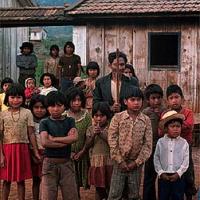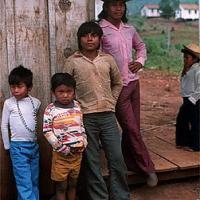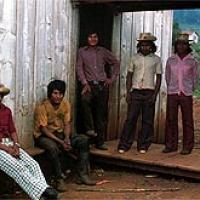Testimony Obtained in 1979, on the Guarani Indians Reservation, City of Chapecó, with Jaci, Wife of the Paramirim Cacique (Chief)
- Jaci: I am making food here, I am crushing. I am pounding it in the mortar. And no seasoning. We have to strain it on a cloth, pound it well and make flour, pudding, soup. With no salt, no seasoning. It has no need for fat. The real Guaranis, ourselves, didn’t eat salt, nothing, no seasonings. Now we understand we must buy fat and put salt on the food, isn’t it? Before, the real Guarani didn’t eat salt. And meat neither. No chicken, no eggs. No matches. We have fire, don’t we? We have the real fire, don’t we? Now we understand that we must by matches to make fire. Yes.
- - Cláudio: And how did you make fire before?
- Jaci: From the “guajuvira” wood, from palm tree wood also.
- Cláudio: And what do the pregnant women eat?
- Jaci: They don’t eat no fat and no salt, they don’t.
- Cláudio: How is childbirth for Indian women? How does it happen?
- Jaci: We have a very good system, one of the best. We know how it is, we have many children. You see the children around here. The women go to bed only to give birth, it has to be the women.
- Cláudio: How is it, lying down or squatting down?
- Jaci: It is squatting down, that’s our way. We lie down when it hurts, you see? We lie down a little bit and get up and squat down. Yes. That’s the way it is.
- Cláudio: You breast-feed for how long, a long time?
- Jaci: We give them the breast until they are big, then we give food like this, soup, “polenta”. We treat the children like this.
- Cláudio: When a woman gets pregnant does, she stops breast-feeding or does she continue it?
- Jaci: She stops it. When she gets pregnant, she stops it and give foods to keep the children strong.
- Cláudio: They get pregnant every to years?
- Jaci: They get pregnant… some of them every three years.
- Cláudio: How many children do the Guarani have, on an average?
- Jaci: Five or six.
- Cláudio: She gives birth squatting down, then does she wait for the “companion” (placenta) to cut the umbilical cord, or not?
- Jaci: The husband or another woman holds the baby. Then it has to be a third woman, who will hold the “companion”. When it comes, we cut the cord, that is our way. It is a good way. We know medications from the forest so that the child grows fine and strong. Another woman must prepare the medication. The child’s grandmother must make medications so that the child will be born well, without pain. So that he won’t be too weak when he is born, we have to cut the umbilical cord with a small sliver of bamboo, so that the baby will be fine. When there are ten families, it is enough. There are some that die, with flu, fever, when they are bigger, when they are one year and a half, two years and a half. They have illnesses and die.
- Some come soon. Some have to take medication so that the baby is born. Some take a long time. The woman has to squat down. When the baby is born, we make a bag with cinders in it so that the milk will flow for the little one to suck, then he sucks and the milk comes.
And the woman cannot drink water that is very cold. When there is a small baby, the woman doesn’t eat food that is salted, nor sweet, nor coffee. She cannot step with her feet at the cold ground. She has to take great care. She can walk but she doesn’t go outside, nor crosses the river, nor steps in cold water. She has to walk inside her home. Here the Guarani Indian women work a lot, they plant watermelon, potatoes, to raise a family. Yes.
She has to work at the crops and clean the weeds and carry the children along so that they help her. When she is 20 years old it is already time for her to be married.


